Over the past hundred and fifty years, the Inn has sought to combat financial barriers to studying and qualifying for the Bar. The introduction of scholarships (a grant or payment made to support a student's education) has allowed many students who previously wouldn’t have been able to afford to study at the Bar to be given the means to. The Inn has a variety of different scholarships that can be applied for based on a range of criteria, awarding over one million pounds of funds a year to students. This month we will look back at the introduction of some of these scholarships, their impact, and their development throughout the years.
The first official scholarship created by Middle Temple was proposed to Parliament in 1876. It was suggested that eight scholarships a year would be awarded to members of this society dependent on the results of an examination they would sit. The examination was both oral and written and covered the subjects of: International Law, Real and Personal Property, Common Law, and Equity, taken at the end of Hilary and Trinity Term respectively. The eight scholarships were divided into four scholarships which were awarded at 50 Guineas, and four scholarships which were awarded at 100 Guineas.
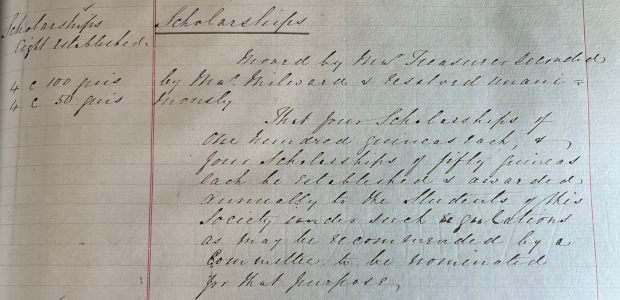
Minutes of Parliament, 10 November 1876.
The first of these Scholarships was officially awarded in 1877 after it had been passed by Order of Parliament. There were a few ‘Rules and Regulations’ surrounding the scholarships, these were that the competitors had to be students of the Inn, to be under 23 years of age for the 50 Guineas and under 24 years of age for the 100 Guineas and that while the students could apply for all scholarships, they were only eligible to hold one. The Middle Temple made the commitment to interview all applicants, regardless of their application, the first of the Inns to promise this and something that is carried out by Inner Temple also.
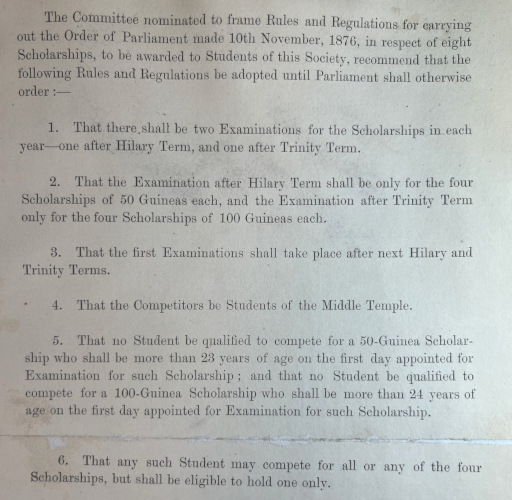
Minutes of Parliament, 1876.
Following on from the success of this Scholarship, the Inn decided to create another one in 1911. A sum of 100 Guineas was set aside annually to establish of the King Edward Memorial Fund, named in honour of the late King who had previously been made Royal Bencher in 1861 and subsequently attended may events and functions at the Inn. From those who applied, one person was selected to receive the prize, either given the whole fund while pursuing research in the fields of English and foreign law or international law, or half the prize and the remainder awarded on the submission of an essay at the end of the period. However, the scholarship was not awarded every year, and during World War I it was, understandably, suspended.
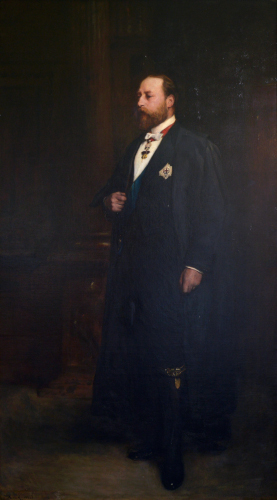
Portrait of King Edward VII.
The Inn has enjoyed many Royal connections, and Edward VII was not the only member of the Royal Family to have a scholarship formed in their name. One member of the Royal Family to be a particular close associate of the Inn, having been appointed a Royal Bencher in 1944, served as Treasurer in 1949 and maintained a close friendship with the Benchers during her life, was the Queen Mother. Fittingly, the Queen’s Mother Scholarship was set up in 1984 when, to mark the fortieth anniversary of Her Call to Bench, Masters of the Bench proposed a scholarship in her name as their mark of gratitude for the interest she had shown in the Inn over the years, and to be a permanent contribution to the educational function of the Inn.
It was proposed that the fund would work in the form of gifts or Covenants recorded as contributions to the Queen Mother’s Fund to then be pooled together and awarded on the advice of the Committee of Masters of the Bench, the number given depending on the income of the fund.
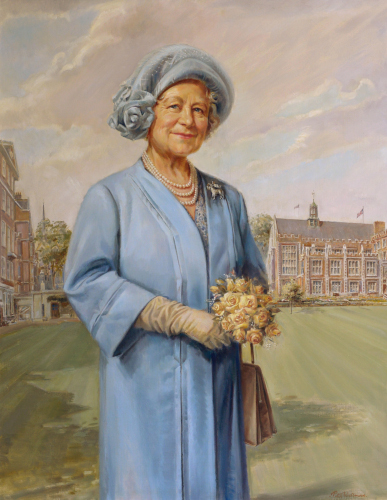
Portrait of Queen Elizabeth, The Queen's Mother.
Several other Royal scholarships have also been created over the years, including the Queen’s Scholarship, which is awarded once a year to the single best candidate who demonstrates exceptional promise. Two further Scholarships named for the Royal Benchers of the Inn are the Diana, Princess of Wales Scholarship and the Duke and Duchess of Cambridge Scholarships. From these, three awards in total are available for candidates who are considered to be both of merit and especially deserving of financial assistance after having had overcome a serious disadvantage or obstacle in the process of qualifying as a Barrister.
Members and Benchers have also contributed to the Scholarship funds across the years. For example, in 1924, Harold Harmsworth, 1st Viscount Rothermere, an Honorary Bencher, set up a Scholarship fund at the Inn in memory of his late father, Alfred Harmsworth, who had been a Barrister and Middle Templar, which became known as the Harmsworth Memorial Fund. This fund was a substantial amount, becoming the chief source of the Inn’s Scholarship income until well after the Second World War. When this scholarship was first set up, Rothermere stipulated that only male members who were graduates of either Oxford or Cambridge University would be eligible to apply for the fund, though this is no longer a requirement.
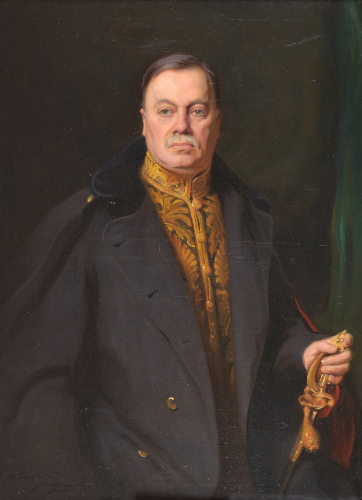
Portrait of Harold Harmsworth, 1st Viscount Rothermere.
As the years went on, and the number of people applying increased, and it was becoming harder to provide sufficient funds to fully support young Barristers. However, in 1935, a very generous bequest was granted in the will of another benefactor, Mr Justice Astbury, Reader in 1915 and Treasurer of the Inn in 1925. Astbury, having helped prepare the Harmsworth scheme and assisted in selecting scholars some years, wrote in his will that any remaining funds, after his family had been supported, should be donated to the Inn on a scholarship on almost identical lines with those founded by Lord Rothermere.
As the two trusts were so alike, the Harmsworth and Astbury Scholarships came to be administered by a single committee with candidates interviewed on the same day and a single list of awards made and students are still awarded this scholarship today.
Another member who set up a Scholarship in his memory is Baron Kenneth Diplock who, after having graduated Oxford with a Chemistry degree in 1929, was Called to the Bar by Middle Temple in 1932. Diplock went on to become King’s Counsel and made many contributions to legal thought and law. In 1981, he delivered a donation of £50,000 to the Inn anonymously, given as capital contribution for the Middle Temple Charitable Fund for the benefit of students. On the death of Lady Diplock in 1990, the bulk of his estate was left to the Middle Temple upon trust for “educational purposes of an exclusively charitable nature associated with the Society.” The Inn agreed that it was important that this be honoured correctly, and the Diplock Scholarship was formed. This Scholarship gives a priority to those who study something other than Law prior to joining the Inn, just as Master Diplock did.
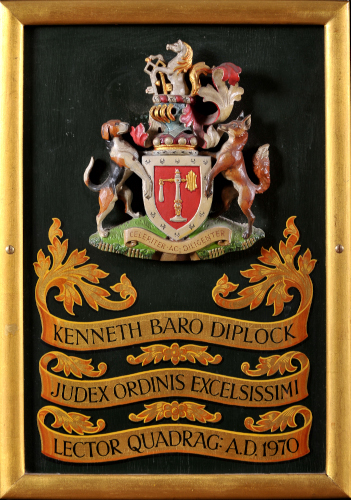
Armorial Panel of Kenneth Diplock.
The excellence of women students began to be recognised and rewarded in the Inn when in 1947, the Chrystal Macmillan Memorial Prize was founded and gave a prize for the female law student at the Middle Temple who scored the highest in the Bar Finals examination. Later awarded (as the Chrystal Macmillan Prize) to a Middle Temple student “at the discretion of the Scholarships and Prizes Committee", it continued for many years to honour Macmillan’s memory, a Middle Templar and graduate of the University of Edinburgh, who was Called to the Bar in 1924 and was a passionate suffragette.
This prize fund went on to help support many women fulfil their future careers as Barristers. One winner, in 1967, was Patricia Edwards (1944-2020) who was awarded the Chrystal Macmillan Prize after being the woman member with the highest marks in her finals that year. Master Edwards, a Bencher of the Inn and Lent Reader in 2017, was very involved with scholarships during her lifetime, chairing the Scholarships & Prizes Sub-Committee from 2014-2018 and often sitting on panels for Scholarship interviews. She showed extraordinary generosity to the Inn with a considerable bequest; generosity which has been marked by a new portrait of her which hangs in the Bench Apartments.
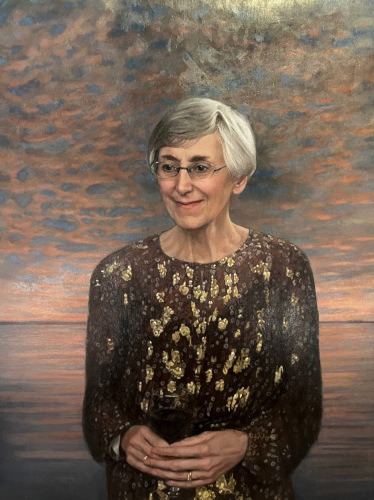
Portrait of Master Patricia Edwards.
Scholarships, both old and new, have provided an exceptional amount of support for aspiring Barristers over the last hundred and fifty years, and will continue to do so in the future. It is thanks to the generosity of the Inn and its members that so many have been given the opportunity to qualify for and practice at the Bar, regardless of their background.
****
If you would like to help give the gift of a Scholarship, please click here: https://middletemplecharity.givingpage.org/Scholarship-Fund